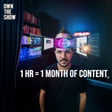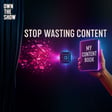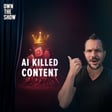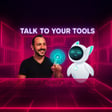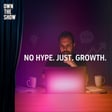Introduction to AI Micro Skills Podcast
00:00:01
Speaker
Welcome back to the AI micro skills podcast. I'm Dan Sanchez and today I'm joined by Mark Angelos who, and we're about to have a really fun conversation about process AI.
Can History Teach Us About Tech Like AI?
00:00:12
Speaker
But even before this conversation started, we were talking in the pre-interview about how history is such a good teacher because nothing's new under the sun. Everything's been seen before and.
00:00:24
Speaker
just based on that little pre-interview conversation we were having, even about blockchain and crypto and all that
Technological Innovations: A Repetitive History
00:00:30
Speaker
stuff going on. I'm excited to jump into this conversation. And I'm totally changing it up on him. So I had a set question list. And now I'm like, okay, well, actually, let's start with history. Now that I know that you have a history, history background, you said you majored in history?
00:00:45
Speaker
So I majored in history from one of the finest engineering universities, Lehigh University, don't ask. And I spent 30 years in finance on the technology front end selling algorithmic AI software.
AI Sentiments: Excitement, Terror, and Uncertainty
00:00:57
Speaker
So with all that, that said, history, these are all just new names for the same thing. You know, like electricity is invented, fire is invented, AI is invented. The process is the same. People are people. But anyway, yeah.
00:01:11
Speaker
Yeah, we were talking about how you can learn a lot about the crypto market just by studying the financial markets of the late 1800s when it was totally a pump and dump scheme and markets were going up and down and it was the wild west back then. You're seeing that in crypto now. It's just interesting. You mentioned like, dude, there's nothing new. We could look at history to look towards the future.
00:01:34
Speaker
which is interesting to me is I literally just recorded and published an episode yesterday about why I did a poll about a poll I did on LinkedIn. And I asked people like how do you feel about the future of AI right now? Do you feel excited?
Is AI the New Dot-com Bubble?
00:01:48
Speaker
Do you feel terrified? Do you feel like it's just hype? Or do you feel like it's uncertain?
00:01:57
Speaker
And it's interesting, based on those results, I found that about a third were a little bit more than a third were in the excited group. About a third were in the pessimistic group, either hype or terrified. And then a third were in this uncertain group. They're uncertain about how to proceed. And I'm like, you know, there's a lot of uncertainty right now about how this is going to play out.
00:02:14
Speaker
But now that I'm talking to you and thinking through like, well, history repeats itself. So is there really that much uncertainty? What can we actually know based on what's happened before? So I'm old enough to have lived through the dot com bubble in the stock market. I was working and this is the
AI's Role in Business and Personal Skill Enhancement
00:02:31
Speaker
same. They were in an investment bubble and a business bubble with AI for sure. So there's a lot of hype around AI.
00:02:37
Speaker
But boil it down as just a technology that's it it's no different from any other technology in the core sense that it's a tool you use to do things with. After that comes all the uncertainty of what do we do with who's gonna do what with it and that's that you can't control that so my point is i will drive the same what you want to see out of it is what you're gonna find right people that think it's gonna be bad it's gonna be bad that that's how they say it.
00:03:02
Speaker
The end of the day is how can you use it to improve your business, to improve your own personal skills, build brand, whatever you're doing. That's the goal here, not whether or not, I don't really care what people think about the thing. It is what it is. It's what matters. How are you going to use it?
From Traditional to Digital Marketing: Parallels with AI
00:03:17
Speaker
How are you deploying the thing? It's team producer versus team consumer is how I like to think of it. You're either put on one side of that coin or the other, AI will help you or it will hurt you.
00:03:29
Speaker
Yep. I mean, I'm clearly in the excited group. Otherwise I wouldn't have started a whole podcast about this and gone deep.
00:03:36
Speaker
leaning into it. But I will say, since you've lived through the dotcom bubble, I didn't. I was in high school at that time. I got my career started during the recession, really. I'm a millennial. That's where I launched my career, like many millennials.
Debunking the AI Bubble Myth
00:03:51
Speaker
I did get to see the digital marketing kick off and the transition from traditional marketing to digital. So that's the transition I got to see and got a front row in.
00:04:00
Speaker
But going back to the dot-com bubble, I've heard a lot of the hype people that fall into that poll often compare it to the dot-com bubble. Like it's going to crash. I don't think it will. It's not going to crash. But where do you stand on it? The dot-com bubble was a matter of people really didn't understand the technology and they just wanted to make quick money. AI kind of went through a small bubble. I'll call it the NFT bubble. The crypto bros are all trying to get rich on Instagram.
00:04:26
Speaker
We remember that two years ago. That's not the case now where wholesale institutional investing is driving AI to the moon. There's real potential with this thing. The one caveat is it's a product that enhances things, but it's not its own product. People are selling AI. That's not the pitch. It's how you integrate, like I say. But the dot-com bubble
00:04:51
Speaker
There was also government monetary policy involved that we're not going to do economics here, but AI doesn't have programs supporting it. It's the free market. People are making some really cool tools. I mean, what chat GPT and open AI has released recently with Sora, it's unbelievable. So there's real legit potential here. I don't think it's a bubble.
AI Tools and Business Economics
00:05:10
Speaker
I wouldn't expect a crash.
00:05:12
Speaker
A lot of the dot-com businesses didn't even have business models. A lot of them were just hype-y, probably interesting, but really kind of like, what's going on here? Versus most AI companies I see getting funding, there's use cases for them. There's at least a pretty good hypothesis on how it's going to make money.
00:05:33
Speaker
I feel like the same VCs that are giving away a lot of money now are a lot of the same ones, or at least the ones leading the big sequoias and stuff. We're around for the dot-com bubble and learned that lesson and are now looking for a path to revenue.
AI Startups: Quick-Money Schemes vs. Legitimate Value
00:05:46
Speaker
Here's the irony, Dan. The concept of burn rate in the venture capital world is you raise a bunch of capital and how fast you're going through it is how long you can last. In an AI world, these tools allow you to do the same productivity with half the expenses or less, meaning employees. That means the burn rate gets extended way the heck out. You now have
00:06:07
Speaker
What used to be a quote unquote crash because you're running out of money, when pets.com goes under because they've run out of money, that's not going to happen with these AI startups when they can run forever. A two-year burn rate is actually now probably a seven-year burn rate. It's much, much longer. Right.
00:06:24
Speaker
What are you seeing in, I wanna get to the whole reason why we even scheduled this podcast to talk about process, but before we get there, what are you seeing as certain about AI because of what you've seen in history?
Consolidation of AI Technologies
00:06:39
Speaker
Well, for one, people are gonna make the quick, they're gonna try to make quick money from it. We're seeing that already. And that's gonna show up as all the garbage content you're starting to already see in LinkedIn. The push button, bang it out,
00:06:53
Speaker
from the Hey Gen avatars with the 11 Labs voice that I've got the imitation Mark Angeles out there pitching you and I'm not really me. We're already seeing that. That's not legit value creation though. So what's certain? There's going to be the grifter approach of how do I make a quick dollar? Scroll through Instagram. You know, if you want to make $30,000 a day, click on this website, that type of stuff.
00:07:16
Speaker
What also was certain, though, is that after the flush happens, it's going to happen eventually. You're going to have companies, it won't be a wipeout in terms of the stock market for a lot of 99. It's going to be acquisition of smaller companies, all these chat GPT based
00:07:34
Speaker
apps that are running off of the back end of OpenAI's API. They're going to get bought and integrated, and you're going to have the greatest hits best of AI tools will be assembled into a Microsoft Office version of it. Frankly, it probably will be Microsoft that does this, co-pilot.
00:07:51
Speaker
But my point is, you're eventually going to have the very large companies, the Oracles, the IBMs, are going to have their own suite of AI products that will initially be just for internal usage and eventually become productized for sale.
Custom GPTs: Innovation Phase
00:08:05
Speaker
That's how it goes.
00:08:06
Speaker
There you go. So you have an initial, I mean, this is, this is how I've seen this play out before you have initial innovation stage where all the different angles are tried and people find out just from sheer numbers. Like what, how, how is it useful? Right. Right. And hence the custom GPT thing is interesting to me because that's where people can kind of innovate and try out a bunch of little things without a lot of effort, you know, so there'll be a million.
00:08:31
Speaker
custom GPTs in the open AI marketplace, but nearly all of them will fail. But if you will test out new use cases and they'll prove it, they might become full apps because they've proven to be helpful.
00:08:44
Speaker
Two points on that, Dan. One is you'll make the Dan app and I'll make the Mark app and they're both cool and they do independent things, but someone's going to buy them both and bolt them together under their other umbrella and it's the thing. That'll happen. That's already starting. But two is, to your point about history, I'm not the first one to say this, but OpenAI has simply recreated the App Store for Apple.
00:09:07
Speaker
It's the same model. You're just going to have, and then eventually you'll get the networks, which we know now as social platforms, where there's a couple of competitors. Clearly Google and Microsoft are in the lead. Amazon's up there with Anthropic. They want to make a run at it. Musk with his grok. You're going to have Coca-Cola, Pepsi, Dr. Pepper, 7UP. It's the same thing just happens to be with technology.
00:09:30
Speaker
So there's expansion, there's consolidation, the big players consolidate
AI Model Comparisons: OpenAI vs. Apple
00:09:35
Speaker
all. There's probably a lot of money to be made if you're one of those smaller apps that gets consolidated right just like there was last time. The mini fortunes are made in that consolidation phase when you get the exits going on. But that right there, the consolidation phase is who do you integrate with? When you create a cool little app, it matters who you partner with next because you could be out of business.
00:09:56
Speaker
Meaning there's a business strategy element. Someone should rip it off. Someone could outrun you. There's a lot of things going on. You got to be thinking more than just, my app is able to take your podcast and chop it into bits for you. That's great. But strategically, how did we build that into a long-term business? And you will need other components and you need to be looking at around and saying, okay, who would want to buy this? Could this potentially be part of a Hootsuite or part of a, I don't know,
00:10:20
Speaker
Sprout social you taking a look at kind of the model. Let's say Spotify did this or
00:10:28
Speaker
any of these large content marketing companies.
Absence of AI Marketing Guides
00:10:31
Speaker
They would say, we need these components. We're going to need an email software. Kajabi is a great example. We've got a community built into it now. We've got the email software built into it now. And you can have classes. It didn't start out that way. All the apps in the AI world right now are going to be assembled into things, companies really, large companies. And we're not there yet.
00:10:54
Speaker
Now we're still innovating, plugging along, bringing it back to marketing. It's funny, I got to watch the social media revolution. In fact, I remember this funny video that were being played in all the board meetings of the social media revolution. It was showing numbers of like, if Facebook were a country, it'd be like the fourth largest country in the world. And it was trying to show to boomers.
00:11:13
Speaker
like how big the social media thing was going to be. I feel like we're starting to see like, there's not a social media revolution with AI, but enough people are talking about it from your Gary Vee's, your Seth Godin's, and all your major like, all the major marketers that I know are talking about like, this is bigger than electricity, like the biggest thing since electricity kind of a thing.
Future of AI Marketing Practices
00:11:35
Speaker
So now, but nobody's written the playbook for it. Nobody's, I went to go find books for it and they're all like little, little books that are like $1 books that you don't really trust. And all the other substantial books were written before open AI launch. So they're already outdated as far as like their approach to AI. To some degree for the academics out there, I'm sure they're still really useful.
00:11:55
Speaker
There's really no playbook on how to use AI for marketing right now. We're still trying to figure it out. How long do you think it is before there is a clear path to how marketers should approach it?
Revolutionizing B2B Marketing with AI
00:12:08
Speaker
I'm going to say two years, just to give you a timeframe. It's going to be a while. Here's why. I was at the Creator Economy Expo. I ran the Web3 track, which was basically
00:12:19
Speaker
Web3 blockchain is not the same thing as AI, but they're similar in terms of cutting edge, so new, people don't really know where to go to learn about it. I was chatting with Paul Retzer, who runs the Marketing AI Institute. This is the exact conversation we're having here, Dan. There is no one repository of information to find, so how does one learn about this? All these B2B marketers that know AI is something, and I should be integrating it, but I don't really know how, where do I learn?
00:12:45
Speaker
the answer is you gotta scrabble it's everything from youtube to going to conferences to these types of podcasts it's. Inefficient at the moment by the time it becomes efficient and that's gonna be like i said a few years it'll be clear okay here's the playbook. To your point and social media did the exact same thing. Gary V was a maniac when he was recording self daily walking the streets of new york city he was an idiot.
00:13:09
Speaker
Next thing you know everybody's got cameras following them so it'll play out over time that this has been best practice in the b2b world. Clearly workflow is part of how where i should be integrated content creations already started.
Experimentation in AI Marketing
00:13:24
Speaker
It's not really there yet with predictive analytics or personalization but that's on the horizon so people kind of know
00:13:32
Speaker
I have a general sense of what I should be doing with AI. I haven't seen the use case or the person teaching it. What will happen next in the next year will be all the books that don't exist yet and all of these YouTube guys and girls and some of them will be quality like yourself and some of them are going to be garbage, but they're just here to get rich quick thing. We've got to sift through all that over the next year or two.
00:13:54
Speaker
You know, the best, the best ideas will rise, right? I mean, some people come up with a hypothesis and that's what they all are. They're all hypothesis. People will test them and the best ones will, best ones will win. Really. You know, what's funny is I'll find out like, Hey, I tried, I tried Mark's thing. I tried Dan's thing and Mark's work and Dan's didn't. So they're recommending it and word of mouth will spread some of the best ones.
00:14:18
Speaker
In the B2B marketing world, they don't love innovation. I know this is any big business. Everyone says they do. I worked on Wall Street. They were quote-unquote innovative. They hate cryptocurrency. Big companies don't like change. That's not new. We're getting to see innovation play out in real time with AI now. The small little operators are leading the way, and that's usually how it goes.
00:14:39
Speaker
And so to say, like, where do how do these companies apply it? Where would they learn? The answer is it's going to be some nobody who's going to put out the playbook as you describe. And everyone's like, yeah, that works. And then it'll be copied. Yeah.
00:14:55
Speaker
I mean, same thing we saw social media. I mean, before Pat Flynn was smart passive income, the SPI community, he was a nobody blogger blogging about and shoot his first case study was about becoming like some kind of like lead eco green, something like certified contractor, developer or something. I'm like, that was his first thing. And that was his case study.
AI's Impact on Job Roles and Titles
00:15:17
Speaker
And then he started smart passive income and started talking about how to blog. And I remember being in marketing back then and thinking like, well, that's cool for blogging.
00:15:25
Speaker
but how do I make a marketing campaign out of that? I remember thinking this at like 23, trying to figure, put the pieces together. I'm like, yeah, but how do I sell the thing that I'm responsible for selling? We were all trying to figure it out back then. If you were following Pat back then, Pat Flynn, you'll know this then. He used to refer to himself as the crash test dummy.
00:15:44
Speaker
I'll make the mistakes so you don't have to, and you can learn from me. And there was a lot of Casey Neistat was doing that, even Gary. So that's the way it's going to go with the AI world right now. People are going to apply things, build things. This whole build itself an avatar with, hey, Jan, and throw a Level Labs voice on it. That whole concept is cool, but it hasn't yet been applied in a legitimate business way yet. And so I'd argue the same thing with blockchain, like all these NFT projects.
00:16:11
Speaker
We're not really effectively value creation, but there is something there. So my point is AI, we're not there yet, but there's going to be, you really want to network. The way to learn is to network. Find what we're doing here. Find the people you think have an interesting perspective. You run across them in social and you just chitchat with them. Those are where companies come from. I used
Becoming a Thought Leader in AI
00:16:35
Speaker
talk about the 30-30-30 plan for thought leadership. I'm like, you could become a pretty solid, it's weird to use the term thought leader, but honestly, a person who influences people's thinking on any niche topic, if you just read 30 books on the topic, or however many are published on a very niche topic, like ABM only had 15 books when I went all into that topic and tried to learn everything I can. Read all the books.
00:16:58
Speaker
go and interview 30 people about it who have written those books or who are experts in the field, and then go and write 30 articles or do 30 solo podcasts or 30 YouTube videos. I'm like, by the time you've gone through that process,
00:17:12
Speaker
And you've read, read everything published to date on the topic. You've talked to all the experts to expand on it and build relationships with them. So now you're kind of in the community and get, I don't know, if you have a guest on your podcast, there's like this weird endorsement effect you get from having them on your show, of course. And then you actually go and teach it. Even just the basics. You're probably ahead of like 99.9% of people on that topic because nobody does it.
00:17:38
Speaker
So here's the only thing, the caveat on that, I agree with you, 100%, but when you teach it, you can't teach it as
Authenticity in AI-driven Content
00:17:44
Speaker
the authority, you teach it as the learner. Yeah, that is the caveat, and that's why I'm approaching AI like I am now, because honestly, very few people are experts, they are out there. I've positioned myself as a student, and it's way easier to create content that way, because you don't have to pretend like you know it anyway. Right. It's more fun, and people will see that you know it anyway, even if you position yourself as a student.
00:18:07
Speaker
As you teach it and be like, Hey, this is what I did. This is what I'm learning. It's what I'm doing with custom GPTs, because I dunno, I've, I've watched some videos on how other people build them. And I'm like, Hey, this is how I built it. It seems to be working. How do you guys think about it? Right. And the thing is when multiple people are doing the same thing in different fashion, eventually best practice emerges. But for right now, it's just a matter of what you may or may not be right. As long as you know that people, and you, you're approaching it the right way. A lot of folks in the space, unfortunately are not. And that's more of the.
00:18:36
Speaker
Instagram TikTok crowd than it is say the LinkedIn crowd. Yeah. One of the things I've noticed about those early pioneers in the digital marketing space, the Gary Vee's, the Pat Flynn's, even the Casey Neistat with YouTube is one of the characteristics I've noticed about all those people is they did an insane volume of content. Like they put out a lot of stuff. Right.
00:18:59
Speaker
As much as people hate the volume versus quantity versus quality game, of course, quality really matters.
Current AI Marketing Processes
00:19:06
Speaker
But I'm like, when it comes to figuring out a new thing,
00:19:10
Speaker
you really just have to experiment and try out a lot of stuff. Part of me is like, man, I need to try out some more custom GPTs to learn. Actually, now I'm starting to think, the thing I'm seeing a lot of AI marketers do is really work through Zapier to build out their automations and process right now, because a lot of the SaaS companies are still trying to catch up in building AI into their process-driven workflows. Like right now, I don't think you can use HubSpot to tap into open API through their workflows.
00:19:38
Speaker
It's a shame. Some of the smaller companies have, but HubSpot hasn't done it. You can just use it in their chat bot or whatever. I'm like, yeah, that's old news. How do we build automation around it? Zapier is kind of the way right now. There's an emerging business type, a business model called the AI automations agency. You're probably familiar with this, but if you're not, it's basically a small business consultancy to help AI up your whatever you're doing. Oracle is doing this, and IBM are doing this, and I think Google at the big end,
00:20:05
Speaker
poorly, but they've got basically a consultative package that they give to software companies in the SaaS world. And they'll go in there and assess where should we be installing AI workflows. That whole space in general right now, it's going to be B2C led, and it's going to be revolutionary because you're going to be able to compete with large companies as a small outfit. However, eventually that's going to get replaced. I'm going to give it a four to five year window where they
00:20:33
Speaker
you won't need to be paying a little guy when you can download the service from Google G Suite. So my point is, I agree with you 100% that we're in the middle of evolution and it's oftentimes hard to see around corners, but the best thing to do is just take stabs. To your point about the content volume, with AI, it becomes too easy to make massive amounts of volume, right? We're already gonna see this.
00:20:59
Speaker
Less about content volume and putting out more social media, but I'm talking about volume as in trying more stuff with AI. I agree.
AI and Social Media: The Human Touch
00:21:07
Speaker
Making more custom GPTs, testing out stuff, putting out ideas and experimenting. I think that's the key to learning AI faster is being the one who experiments and tests and fails and finds what works and what doesn't.
00:21:20
Speaker
The reason you're going to be successful with this, Dan, and most people won't, is the lack of ego. The problem with big businesses, especially in the B2B world, is they don't want to be wrong. They don't want to look foolish in front of their clients. And I can respect that. But the reality is that's how you figure it out. When Gary Vaynerchuk is putting out videos of him and he's half dressed and he hasn't shaved and he's wearing a t-shirt, you got to be comfortable to get the volume of the authenticity on social came out because of the volume. You couldn't fake it.
00:21:49
Speaker
You can now is my point with AI. So social media content is going to be AI driven and there's going to be a decline in authenticity.
Emotional Intelligence vs. AI
00:21:59
Speaker
Right? Especially if I can tell the machine when chat GPT can make my personality, you know, make me sound like Jordan Peterson. Well, and then I can AI myself up to look like it's me with these amazing words. You won't really know who I am at that point.
00:22:15
Speaker
Which by the way, speaks to the value of IRL. We're going to get to, we're going to go right back to coffee meetings and beers over bar tops. Because before you hire someone or do a business deal and you've done, you've dealt with them remotely for a while, you're going to want to meet them. And then the rubber hits the road. Makes me think of this one relationship I have through LinkedIn that refuses to do video. And so I don't know.
00:22:41
Speaker
Who he really is. And I have a hesitancy with this one person because I don't know. They've refused to like do video calls for some reason, because I don't know if they're afraid of their face. They have a photo on their profile, but I'm like, we've all been on, feels weird, feels off. And there's going to be more and more of that as people are able to fake even video soon, right? So I can see where you're going with that. Cause I'm like, I've tasted that and I'm hesitant.
00:23:05
Speaker
This is the Zoom call when the person doesn't put the camera on. And you're like, dude, there's a human element we're missing here. So AI is going to bring that back around again. You're going to see soft skills leapfrog to the front. We're entering an era of EQ over IQ, where the smart people are smart, but the AI can do a lot of that.
Trust in an AI-driven World
00:23:24
Speaker
What it can't do, it gets you to third and a half base, but to close that deal, I want to know who Dan Sanchez actually is. I'm going to go meet this guy for dinner. We got to build trust. Right. And that makes a big difference.
00:23:35
Speaker
So AI is funny enough, all the tech brings it right back to the human element. So the note I'm taking down is decline in authenticity, making, if you can actually pull off authenticity, makes it more valuable because trust is going to tank. And we're going to see trust tank because of all the, of course AI is going to bring all the misinformation out. So people's trust is going to go down and it's going to be,
00:23:59
Speaker
I think thought leadership will actually become bigger because of that. There will be so much misinformation. People won't be able to fact check at all. So they will do the shortcut that they've always done and follow the leader that gives them the breakdown. So thought leadership only grows because there's too much stuff to check. Thought leadership. So we'll bring it to a few leaders on different topics. I agree with you. Thought leadership though requires that you have original thoughts on the thing.
00:24:26
Speaker
Oh, of course. And a lot of folks don't. A lot of these leadership management is different from innovation. Yup. No, I mean, a lot of them will be real thought leaders. They will probably be a bunch of fake thought leaders that do people into thinking they're thought leaders too. That'll be a problem. Right.
Media Driven by Personality-led Content
00:24:44
Speaker
But people will for certain go to individuals or trusted voices to deal with the sheer amount of volume of content. And we think we have a lot now. It's like, dang, in a few years, it's just going to be
00:24:56
Speaker
Hold on a second. That's not a problem. That was the case with traditional media back in the day, back to history here. There was an endless number of commercials in old television. How many channels are on cable? 999? Too much content is not the problem. The problem is the authenticity piece. You're going to have a micro-content world of
00:25:18
Speaker
cults almost. The cult of Dan Sanchez. I love this guy. I'm going to follow him. Whatever he puts out at podcast, YouTube, it doesn't matter. He's my guy. Gary has done this. Alex Romozi has that going on right now. Once you're bought in on the person, and so it becomes a personality led media front end. And the AI can enhance all that, but the AI is not the sale. It's the bolstering effect. And that's not just about distribution. You're
00:25:49
Speaker
people want to find out their information from a specific source. The reason news is biased left and right, you know, Democrat, Republican, it doesn't matter. I want to hear my opinion from about the news. It's the same thing with business.
Innovation vs. Efficiency in AI-driven Companies
00:26:03
Speaker
So when I learned about my AI or I want, or I want to hear where I think the future is going, I want Seth Godin to be the guy to tell me that, or, you know, I want to hear it from whomever I believe has their finger on that pulse. Knowing that that's going to be a thing,
00:26:18
Speaker
How do you think smart marketers are positioning their companies now to leverage AI, but still lean into authenticity? So are we talking B2B? When you say smart marketers, I think of small innovators like yourself and myself. If you're talking B2B, I really don't think they're positioning for innovation. I think that the large B2B companies are positioning for cost reduction in recessionary time. It's not the same. So if I can replace my, Google laid off 12,000 people,
00:26:47
Speaker
How many of that was because of AI? Probably not yet directly, but if I could lay off my department, take eight people down to two, I'm going to. That's not good or bad, it just is, but that's how companies think. That is not how a guy like you or I who are building brand and trying to grow a business think. I mean, they talk about it. They certainly talk about it internally. They're like, we need thought leadership. Why can't we position our CEOs or some other subject matter expert or some whatever?
00:27:14
Speaker
But you know, your gas detector can smell that, right? You've been in companies where you're like, yeah, this guy's full of it. I'll tell you a story. During 2008, I was working at Lehman Brothers, ironically, every day when they went under. And I come to work just the last week of the place was in business. And there's some guy I've never seen before shouting, screaming from the floor, like, F this place, you know, we're going to recover. We're going to come back strong. And I'm like, who is this guy? And they're like, that's Dick Folt. He's the CEO. I'm like, I've never seen this guy before in my life. I've been here for years. I'm like, we're done.
00:27:42
Speaker
The firm's over. You could smell that it wasn't true, but they
AI's Influence on Workforce Dynamics
00:27:46
Speaker
wanted it to be. Big companies talk a good game. But a founder-led firm like, let's say, SpaceX, or even back in the day, Amazon, or way back in the day, Bill Gates and Steve Jobs, those types of firms are innovating because there's a person that built it is running it. When you get to a Walt Disney or Paramount Pictures, the founder's not there.
00:28:11
Speaker
Marvel now has this problem. So all of a sudden the movies will start to go off the rails because the vision's gone. So my point is AI right now will enable a lot of people. And if you're a founder trying to do the right thing, build real marketing innovation, you're going to be able to. But if you're just looking to save money and use these tools to how do we increase the next quarter? That's what most of the companies out there will do. Yeah. Well, the founder brand is huge. I mean, you're seeing,
00:28:38
Speaker
Seeing a big with Mr. Beast right now who's breaking away and we'll cross them be, be the number one YouTuber in a few months here. I'm walking through the supermarket last week. I see feastables, chocolate chip cookies, Mr. Beast, way overpriced, double the price of whatever a box cookie should be. I'm like, ah, I'm going to support Mr. Beast. Like I want Jimmy to get this money. So I bought it. My point is like, I wouldn't have just, it wasn't the cookies. It was the personality. Yep. That's where we're going.
00:29:04
Speaker
So coming back to the big companies and how they're going to handle this, I've been thinking a lot about that. So I'm like, you know, AI is going to take a lot of jobs, but not in the same way. It's not like companies, at least this is my prediction. It's not like companies are going to do an audit of like, what can AI do that we don't need people for? I think what will happen is big companies will do what big companies do. They will lay off a bunch of people for other reasons.
Evolution of Job Roles in an AI World
00:29:25
Speaker
to bolster their stock price, to get better margins. Oh, they overhired and now they need to trim back. Oh, they're doing a reorg. They lay off a bunch of people. And I think just out of necessity, they'll still have big goals for the people that are remaining. And the only way to achieve it, the managers will do the math and be like, well, we just
00:29:45
Speaker
laid off half this department. If we're going to be held accountable to the same targets, we need to figure out how to do that. Oh, look, this AI solution can help us get there. And if they can actually train their team well in AI and that team of two can perform like a team of 10 or 20, all of a sudden the hiring back becomes much slower.
00:30:06
Speaker
Yes. There's a cottage business right there in the training of these big companies in the AI, to your point, number one. Number two, I'm not a believer that there's a wholesale wipeout of jobs because of AI. That doom and gloom is not true. What will happen instead is the transition of work type, meaning
00:30:24
Speaker
I use the script i think they're great and you don't really love them so much but like in terms of. B roll is lacking in the script right now it's just not great so instead of taking all these. Programers and developers are normally going to be doing whatever they're doing to build up the company's productivity they're going to have to integrate better be roll into what they're going to shift people.
00:30:45
Speaker
So all of a sudden, I want to get my AI into my tool. I know where AI can help my company, but I don't have that integration capability.
Future Skills for Marketers
00:30:53
Speaker
So we need to build the APIs. We need to have these people on board that can help create this new division. Google's going through this right now. Google lays off 12,000 people with record profits, which never happens. Publicly traded companies only fire when they're having tough times, not at great times. That tells me they're actually shifting jobs.
00:31:12
Speaker
And that's what's going to happen with AI. You're not going to lose jobs. They're just going to transition to, well, we need to AI up the thing we've got, and we need to get the people to do that. So when you can't get a job as a traditional computer programmer, because this is just not chat GPT, you can do the coding. So you're going to then transition to, OK, well, I'm the integration guy for the AI onboarding for the API front end. That's all that'll happen. The money's over here now. Great. That's why people go into investment banking or coding in the first place.
00:31:42
Speaker
I did think about that too. Marketing is one of those departments specifically that is a never ending black hole of time, talent, and treasure, budget. You can always put more into it. So I'm like, well, if companies, a team of two might be able to do what a team of 20 marketers used to do, properly equipped with AI.
00:32:03
Speaker
but they'll still want to grow more. And again, it's a black hole. So you could always do more. So you probably might hire that team back. And now you just have a team of the product, the productivity of what is now 200 marketers. Cause you, and now it only costs the, the, the salary rates of 15 or 20 marketers. Right. So you just expand and the quality of the content becomes better. And hopefully, hopefully the, like the content's actually good, not just flashy because it's got AI video driven driving it now.
00:32:32
Speaker
With regards to the marketer of the future though, Dan, I think there's a skill set change happening. I think that the marketer of the future, A, has to have a lot more technology knowledge, not be a technologist, but be familiar with how these tools can be integrated. They have to be a strategic thinker of workflow building. I can't rely on my boss to say this is the best way to do it, which is the way it used to be top down.
00:32:53
Speaker
It has to be, I myself use these tools, I dabble with them in the evening, I know that we should probably be doing this, and it's bottom up. But more importantly, there's an element of sales and marketing that are mingling now. It used to be very distinct silos between selling and marketing. The marketing folks didn't speak to the customer, the sales people would yell at the marketing folks because the sales training materials weren't right, etc.
Merging Sales and Marketing Roles
00:33:16
Speaker
You now are getting this media front end that you need to have a brand out there, whether you're an individual or a company. So this storytelling element becomes sales talks to the customers. They can share insights. The marketing folks know storytelling. So those two skill sets are starting to come together and the folks who can master both with a technological bend, they're going to win. Like that's who I would hire.
00:33:44
Speaker
You're saying people who are good at sales and marketing? Yeah.
00:33:49
Speaker
Yeah, so this is, go ahead. I was thinking about it. I'm processing it. I'm like, I don't think you have to be good at those two things. I think the marketers who know solid marketing principles, the ones that don't change and do the technology thing are probably going to jump over their marketing leaders ahead of them. I mean, that's what I did with digital. I learned all the digital stuff. I learned all the tech. And then all of a sudden I got promoted to director really fast because I knew how to run a digital marketing campaign before most did.
00:34:18
Speaker
Um, great. I think that thing will happen again for those who know how to leverage AI. I don't know. I'm trying to think of like how use, like use, knowing sales is useful. And I've been in some sales role. I won't say I'm a great sales rep.
00:34:31
Speaker
I'm not talking about outbound cold calling. I don't mean pounding and pitching. What you're doing right now, Dan, there's a sales element to this. Being able to connect with me, pull on threads. We don't have a script here. You're going down the rabbit hole with me and so am I. That's a skill.
00:34:48
Speaker
Not every marketer has that. The marketing research teams of the past... You talked about the soft skills. I'm reaching out for people on podcasts. To some degree, I'm pitching. It's an easy pitch when you're selling to come on the podcast for free. To some degree, it's about learning how to drive conversations. Yes. I don't know. Pulling the right information out of people. It's fostering relationships. That's a sales thing, I guess. It's fostering relationships, which I would argue is a sales element to that.
Is B2B Marketing Outdated?
00:35:18
Speaker
But again, marketing is well, marketing and storytelling, really being able to frame up and position, that's not so much sales, that's marketing. And both disciplines can learn from each other, but there's a coming together right now, in my opinion, I could be wrong. I see what you're saying. You're talking about that EQ stuff you were talking about a minute ago.
00:35:37
Speaker
Yeah, I'll tell you a quick story. When I was working on Wall Street and I was selling high-tech AI trading software to hedge funds, no one knows. These guys are finance guys. They're not tech. They don't understand what it does. I'm writing an article once a week on the weekends on my own for LinkedIn to just post about... And I'm using very simple comparisons of how this thing protects your orders in the marketplace. And it's all Star Wars based analogies. Ray shielding, TIE fighters, because I'm a nerd.
00:36:02
Speaker
Off the back of that, I become the top selling sales guy, and I'm nothing special. I didn't know what content marketing was, but the reality was the principles of marketing applied in sales in a B2B world, it was gangbusters. The B2B still isn't leveraging that.
00:36:19
Speaker
Neither marketing nor sales is fully, there should be a circulating system of customer cutting edge stories, cycle back into marketing, becomes content that the sales team then uses. And this little- It drives demand, so when people come, they're actually hungry. I see no firm doing that right now.
00:36:38
Speaker
Yeah, very few, very few are. It's, it's insane.
AI in Relationship-building Marketing
00:36:41
Speaker
Like I was just working at a tech company and it was backwards. I'm like, instead of driving demand with podcasts, they were pushing people to webinars and it was half content, half sales, and not really good. So much work. They're so inefficient. I was like, what is going on? So this gets at the intent. And I, as I traded notes with other people and B2B tech, and these are midsize companies too startups. And I was like, man, we're all pulling from a broken playbook that just doesn't work anymore.
00:37:06
Speaker
Yet the writing's on the wall and everybody knows, at least it feels like everybody knows what to do on LinkedIn. At least the people who post on LinkedIn all post generally about the same stuff. I'll tell you, build trust. People will come inbound and they'll want to buy. I mean, Chris Walker has been banging the drum on for years now.
00:37:22
Speaker
I'll tell you why the playbook is broken, then I'll connect it to AI. The playbook is broken because the buyer has changed. They don't need a salesperson for information anymore. The internet, social media connectivity, every selling, that all happens today is social selling, whether you know it or not. That's not what these B2B companies are doing. They're not actually trying to build friendships. They're trying to sell stuff. Big difference.
00:37:46
Speaker
Chris Walker's right. The way they're measuring it is all incorrect because you can't really measure relationship. If I trust Dan and Dan's got a new product, I'm going to buy Dan Sanchez's product. I like the guy. On the other flip side of that, AI, it makes you more efficient. It allows you to scale yourself. Yes. How can you do that to build relationship? How does that play into your relationship building capabilities as a company? That, in my mind, is the magic question.
00:38:14
Speaker
People should be looking at these tools not as efficiency plays in workflow building and I can just do more with less. Yes, that's true, but customers don't care. At the end of the day, the customer either loves you enough to reach into their wallet or they don't, or they're not sure. It's what you said about the guy that won't get on Zoom calls or video, whatever. You need to have that connectivity to have commerce.
Long-term Sales Success: Relationships over Features
00:38:39
Speaker
How does AI play into your strategy to build those relationships? At the end of the day, this is going back to history again. It's relationship only. Period. I'm not buying from you because you have an AI whiz thing in the background. I don't care. I'm buying from you because I love you. And by the way, you have AI in there? Great. I mean, there probably is a place where like the product is so good that it just seems obvious that it's going to help. I think personality can drive a lot of it. It's not the only way to win.
00:39:08
Speaker
It's a major way to win. It's becoming an increasingly important way to win or probably the most effective way to win. I will say that a strong value proposition, because the product is so good, is becoming less. It works less and less because people are able to replicate what you have so fast that a product advantage only is an advantage for three, four, five, six months at most.
00:39:36
Speaker
I agree with that. Microsoft co-pilot is a thing right now. Based on what I've seen of it, it's kind of rough, but it won't be long before Google has their own co-pilot and it'll be comparable to Microsoft's. It just won't be. There will be a competitor and then Apple will finally get in the game and theirs will be interesting. Product-led growth is hard because it's hard to stay on top versus personality and trust. Well, that carries longer. It's also way harder to build.
00:40:05
Speaker
When OpenAI comes out with chat GPT and it is so light years ahead of everything else out there, I don't need to know Sam Altman. There's no relationship needed. That product is so astounding. I'm going to use it. When Zuckerberg rolled out Facebook, it was amazing to be able to connect with your friends and family. People use it.
00:40:22
Speaker
What happens over time, though, is all the features get copied, everything becomes competitors arise, you now got Gemini, et cetera. Then it is, well, Zuckerberg is manipulating your data, and he's not really trustworthy. I'm not saying this is true, but this is the perception. Right. Well, now you do need to have a relationship aspect here. Can we trust the company? In the back of people's mind, open AI is great. Suddenly, Sam Altman has kicked out as the CEO. Well, now there's question marks. Now he's back.
AI Technologies: Rapid Development and Uncertainty
00:40:48
Speaker
Okay, well, it just happened.
00:40:49
Speaker
There's this element of, okay, the product is the product. No question that that thing works amazing. But there's another factor is all I'm saying. And as time goes by, that factor grows. You can't just, when Steve Jobs rolls out the iPhone and is so unbelievable, yeah, we're all going to buy one. But over time, it's, I really like Steve Jobs. I know that that company stands for privacy. I know that the company is protecting me. Whether it's true or not, public perception matters.
00:41:18
Speaker
man, the PR game. It's always about the perception. We haven't hit that yet because AI is still on the cutting edge.
00:41:24
Speaker
Yeah. It's fun to navigate where we're going with AI. I do find that there are some uncertainties. Like we don't know. I mean, we know it's happening fast, but we never know exactly what, what nobody predicted that Sora, like, what was it? Sora was coming out and it hit everybody. We're all kind of expecting like, Oh, it'll probably be mid-level good next year in 2025. And now it's like, Oh no, hello. It's this year that it looks mid-level or mid-journey good.
00:41:53
Speaker
It tends to be accelerating. So we're not exactly sure how fast it'll accelerate or what we will be doing a year or two from now. We just know it's going fast. And so there's uncertainty there, but there is certainly a lot more that we can know if we just dig into what's happened before. If we just dig into.
00:42:10
Speaker
how these macro changes have played out before. So it's been fun talking about what we can expect. Some of the things I've noted from this conversation is the small players are going to lead the way. There's going to be a lot of innovation. A lot of it will lead to things that don't work, but some will lead to some that do work. People are going to gravitate towards people and trusted voices as the amount of information rises.
00:42:38
Speaker
I don't trust becomes more of a Less becomes more and more important.
Key Strategies for Engaging with AI
00:42:43
Speaker
It's always been important, but it only becomes more important When you can't believe what's on the screen, right? I can't trust that what's on the screen is legit. I need to really know you Yeah, so in-person meetings become much more important. Just funny cuz this is these are the things you can't do with AI No, right. So the things you can't automate or enhance with AI become some of the more important things. I want to use AI to keep all the other things that got to keep going and
00:43:09
Speaker
running so that we can actually take the time for the important things that are in person, that are doing the things that only people can do. To benefit your audience, Dan, one of the things that takeaways I would want to share in an AI world, if you're doing any kind of social media, it becomes more and more important to be doing live.
00:43:29
Speaker
any type of webinars, live, any type of Q&As, live, when people can see the real you, it becomes more and more important when I know that there's a push button, Mark Angelo's, that can pop up on screen at any time and I don't need to actually be there, versus the actual back and forth. AI is advanced, but it's not there yet where you can have a real time back and forth with it and think it's live. So my point is that authenticity of personality is the sale for your folks that want to build brands, that want to grow. If you have something to sell,
00:43:59
Speaker
Who you are matters. Well, this has been a fascinating conversation. I'm trying to figure out how to phrase this, but the more clarity that can be made, I think is one of the goals of this podcast because there is uncertainty. The more clarity that there can be, the more people can find their way forward and find their way into this new thing that's going to happen.
00:44:23
Speaker
because roles are going to switch, some jobs will be lost, new jobs will be created. We're not exactly sure what the titles of those new jobs will be, but it's going to happen. So if we could figure it out together, create more clarity, create some right new maps for people to follow, I think this is the goal. I think that three things I would say for action steps for people. Number one, learn about how AI is being applied inside your industry, right? Be a voice in there. And you can be wrong, but have an opinion because you want to be in the conversation right now, it's early days.
00:44:52
Speaker
Number two, make sure that you are putting yourself out there. And again, I think that live engagement, you can chat GPT, the auto engagement already on LinkedIn, it's happening, it's awful. But live video back and forth with people is going to be important. So figure out how to get that into whatever you're doing.
00:45:12
Speaker
And number three, networking. There's nowhere to learn other than from people who are doing the same thing you're doing and making the same mistakes in their own way. So the conferences come back into importance. The DMs and this type of thing, being able to collab on podcasts, like help people and you will learn from their mistakes versus just your own.
Networking and Collaboration in AI Learning
00:45:32
Speaker
Who has a conference on AI and marketing? I'm a big fan of the Marketing AI Institute. Paul Retzer and team, they do a good job.
00:45:41
Speaker
They run out of Cleveland and they do a couple of year actually. That's generally geared towards large B2Bs, which is fine. Joe Polizzi, who's a friend, has done a good job with the Tilt and the Creator Economy Expo, more geared towards creators and small solopreneurs. They have folks like Justin Welsh, et cetera, involved. And the tech side, I think Greg Eisenberg is a great influencer on LinkedIn. I listen to the All In podcast. Those guys are great.
00:46:09
Speaker
You're going to have to vary between podcasts, YouTubers, and conferences, but don't just be a passive absorber of information. Go out and talk to these people. Try to help them. Quick backstory for those who don't know, Dan, when you and I were engaging on social, I hit you up with, here's some things I think might help your business, maybe, maybe not.
Podcast Conclusion: Networking Importance
00:46:29
Speaker
You were talking about some interesting little things that you were dabbling in. And I was like, hmm.
00:46:33
Speaker
There was no ask, I wasn't looking for anything, but networking and helping people in a time of learning is the number one thing you can do for yourself.
00:46:42
Speaker
Absolutely. That's why I'm trying to talk to anybody and everybody who's doing something cool with AI and marketing through the show. And it's been fantastic. I've learned, I mean, this is where the main learnings are because again, there are no books on this topic. It's a brand new topic. So no one's written the playbook for it yet, like we talked about in the beginning of the episode. It's being written now, but people are still on the experimentation mode. So the best way to learn, find out who's doing the experimenting.
00:47:05
Speaker
You know this, Dan. When people come to you and say, where do you learn about your AI? Your answer is always like, I scrabble it up from wherever I can. There's no one place. Yeah. There's a bunch of little places. I'm starting to think that needs to be a future episode of where I'm learning AI from right now. Because there's a few YouTubers that have stood out to me and a few newsletters that I'm getting news from. A couple of different sources. I know everybody has their own sources, but I have my own. So future podcasts coming. Great. Probably a short one.
00:47:32
Speaker
Thank you so much for joining me today. Where can people go to connect with you, learn more about what you're doing in marketing and in AI? Sure. First of all, it's an honor to be here. Thank you for having me. Best place to learn about me, LinkedIn, Mark Angelos. I also run a company called Invictus Communication, Invictus.com. We do basically content marketing for financial and technology folks. That's it. Thanks for getting to join me. Thanks for having me, Dan.




![What’s Your Authority Score? [The 5-Factor Test] image](https://media.zencastr.com/cdn-cgi/image/width=112,quality=85/image-files/630c9f06819f8b3dba5fa460/cfbaccba-f587-45de-a41f-e2c99c15e2a5.png)
![The Audience Growth Engine [Full Framework] image](https://media.zencastr.com/cdn-cgi/image/width=112,quality=85/image-files/630c9f06819f8b3dba5fa460/46b84fd1-e856-4687-9aee-6b4a7e0bc7ff.png)

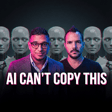

![The "Dream 100" Execution Plan [Google Sheet System] image](https://media.zencastr.com/cdn-cgi/image/width=112,quality=85/image-files/630c9f06819f8b3dba5fa460/fcd89374-76a4-4e58-a2e3-2bb7ddda4364.png)
